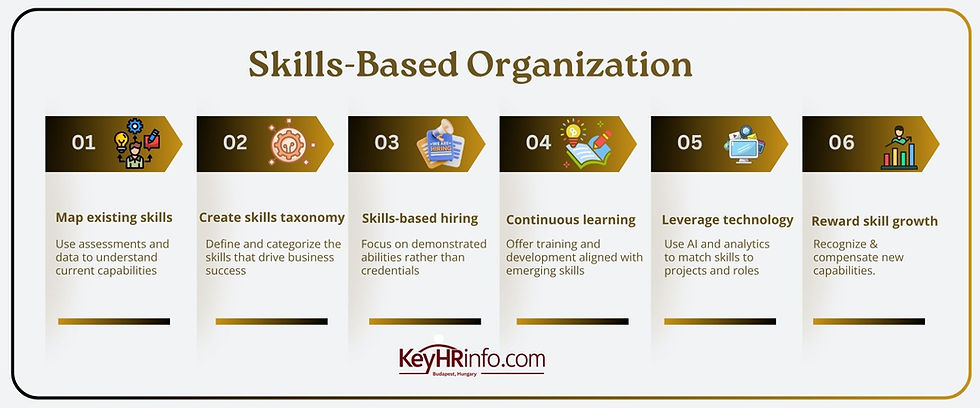The Rise of the Skills-Based Organization: Redefining Work for the Future
- Team of keyHRinfo.com
- May 1, 2025
- 3 min read
Updated: Nov 8, 2025
keyHRInfo.com is a Hungarian HR and Payroll Consultancy company for local and international startups and SMEs
The traditional job description is fading fast. In its place, a new model is emerging — one that values what people can do over what their titles say. The skills-based organization (SBO) is transforming how companies hire, develop, and reward talent. By focusing on skills rather than roles, organizations are becoming more agile, inclusive, and future-ready.
What Is a Skills-Based Organization?
A skills-based organization prioritizes employees’ capabilities over job titles or tenure. Instead of rigid hierarchies and predefined roles, work is organized around skills, projects, and outcomes. This approach allows companies to deploy talent dynamically, matching the right skills to the right tasks at the right time.
Key insight: In a skills-based model, people are valued for their potential and adaptability, not just their position.
Why the Shift Is Happening Now
Several forces are driving the rise of skills-based organizations:
Rapid technological change: Automation and AI are reshaping job requirements faster than traditional structures can adapt.
Talent shortages: Employers are widening their search to focus on skills rather than degrees or experience.
Employee expectations: Workers want growth opportunities and recognition for their unique abilities.
Business agility: Organizations need flexible talent models to respond quickly to market shifts.
Example: A company facing a sudden digital transformation can reassign employees with data or coding skills to new projects without waiting for formal role changes.
The Benefits of a Skills-Based Approach
Adopting a skills-based model offers advantages for both organizations and employees.
For organizations:
Greater agility and innovation.
Better alignment between talent and business needs.
More efficient workforce planning.
For employees:
Clearer career pathways based on skills growth.
Increased mobility and opportunity.
Recognition for diverse and transferable abilities.
Key takeaway: A skills-based culture empowers people to grow while helping organizations stay competitive.
Building a Skills-Based Organization
Transitioning to a skills-based model requires strategic planning and cultural change.
Steps to get started:
Map existing skills: Use assessments and data to understand current capabilities.
Create a skills taxonomy: Define and categorize the skills that drive business success.
Adopt skills-based hiring: Focus on demonstrated abilities rather than credentials.
Enable continuous learning: Offer training and development aligned with emerging skills.
Leverage technology: Use AI and analytics to match skills to projects and roles.
Reward skill growth: Recognize and compensate employees for developing new capabilities.
Key insight: Technology enables the shift, but culture sustains it.
Challenges and Considerations
While the benefits are clear, the transition isn’t without challenges. Organizations must overcome legacy systems, cultural resistance, and data complexity. Leadership commitment and transparent communication are essential to ensure employees understand and embrace the change.
Example: Without clear communication, employees may fear that a skills-based model devalues their current roles rather than expanding their opportunities.
The Future of Work Is Skills-First
As industries evolve, the skills-based organization will become the new standard. Companies that invest in understanding, developing, and deploying skills effectively will lead the future of work. This model not only drives performance but also creates a more equitable and engaging workplace — one where every skill counts.
The rise of the skills-based organization marks a fundamental shift in how work is defined and delivered. By focusing on skills, organizations unlock agility, innovation, and inclusivity. The future belongs to those who see beyond job titles and recognize the true value of human capability.
FAQ
What is a skills-based organization?
An organization that structures work and talent management around skills rather than job titles or roles.
Why are skills-based models becoming popular?
They offer agility, inclusivity, and better alignment with the fast-changing demands of modern work.
How do skills-based organizations benefit employees?
They provide clearer growth paths, more mobility, and recognition for diverse abilities.
What role does technology play?
AI and analytics help identify, track, and match skills to business needs in real time.
What is the biggest challenge in adopting this model?
Cultural change — shifting mindsets from traditional hierarchies to flexible, skills-driven systems.
keyHRinfo.com offers innovative HR and Payroll services for startups from reviewing the needs, to the solution proposal, implementation and operational phases. Also ongoing assistance for operational, audit and Mergers and Acquisitions.
_edited.png)





Comments